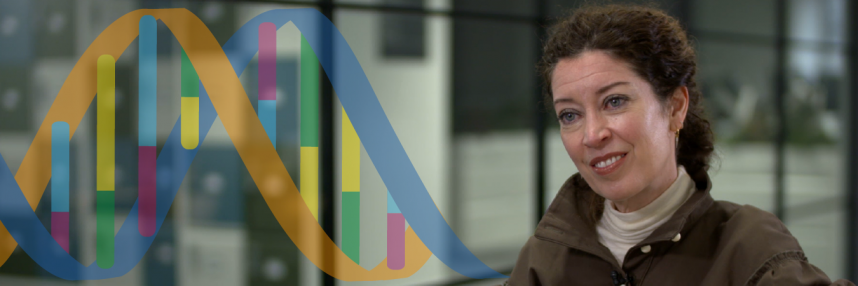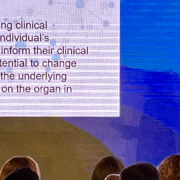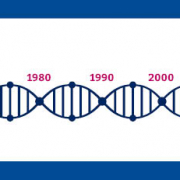Why learn about genomics?
Our clinical director provides an insight into how genomic technologies have developed and the increasingly crucial role of education and training
This blog post has been adapted from a conversation between Professor Kate Tatton-Brown and Jonathan Gibson, originally filmed for the ITN Productions digital programme ‘Shining a Light on Rare Conditions’ for Rare Disease Day 2022
So, Kate, firstly, how does genomics differ from genetics? Why does the distinction matter?
So, it’s semantics really. Genetics refers to a single gene or a gene-by-gene approach, whereas genomics is a much larger scale approach to the entirety of the genetic material in the genome. When I started in genetics over two decades ago, our technologies at that time allowed us to sequence only one gene at a time. This was incredibly expensive and very laborious as exemplified by the Human Genome Project, which occurred at the turn of the millennium – that took nearly 10 years to complete and cost billions of pounds. Since the advent of new, very powerful technologies (collectively known as next-generation sequencing technologies), we can sequence the entirety of our genetic material, or our genome, in just a few days, and at a cost of less than a thousand pounds per genome. That’s really transformed how we approach genetics in healthcare.
And from a practical perspective, what kind of difference does that shift make in terms of diagnosis and management of genetic conditions?
As I previously mentioned, prior to the introduction of next-generation sequencing technologies, genetic testing was very expensive and very time-consuming. To access genetic testing as a patient you would jump through many, many different hoops. For instance someone might see their GP, who would refer onto a secondary care practitioner who would, in turn, refer to a clinical geneticist like myself. The clinical geneticist would then meet and assess that individual. If a specific genetic syndrome was suspected, they would request the appropriate genetic investigations. Genetic testing was therefore confined to highly specialist services and could be very hard for patients to access. The result was a long, complicated patient journey, dependent upon the correct referrals and the experience and expertise of the clinicians the patient would see along the way. This journey has been coined the “diagnostic odyssey”.
Now that we’re able to sequence the entirety of the genome in just a few days, we’re massively reducing this journey for many patients, feeding back a result within six months in some cases rather than years. That’s game-changing; it means that patients are getting diagnoses much earlier, giving them access to condition-specific information and more personalised and effective treatment strategies. Reaching a diagnosis can also have knock-on effects for the family as it can trigger screening for the wider family, allowing them to make reproductive decisions appropriate for them.
Why is it important for everyone in healthcare to know a little about genomics?
Genomics is cross-cutting – it has touchpoints in every specialty and every profession. Some healthcare professionals will use genomics day-in, day-out in order to appropriately diagnose and manage their patients, whilst other healthcare professionals might just utilise genomics every now and again. It’s important that everyone understands the level of genomic knowledge that they need for their own clinical practice. Our mission at the Genomics Education Programme is to help support everyone in the healthcare system – from those people who need a little bit of knowledge, to those that need a lot, and offer that support in an equitable and accessible way.
And how is the Genomics Education Programme helping to move things forward and impact on education and training?
We’re trying to get that message across in lots of different ways. We’re focusing on both undergraduate and postgraduate curricula – for all healthcare professionals – with many different strategies to engage people at different stages in their career. We’ve also been developing different types of tools so that we can engage people of all learning styles and abilities.
One project we’re really excited about is called GeNotes or ‘genomic notes for clinicians’. GeNotes launched last week and is a ‘just-in-time’ or reactive online resource that aims to capture a clinician at the point of patient care – so just before, during or after a patient consultation. It’s aligned to the National Genomic Test Directory and will help support clinicians to make the right genomic decisions for the right patients. For example, it will support clinicians to choose the right genomic test and it will support them to interpret and feed back genomic results appropriately.
GeNotes consists of two tiers. Tier 1 is called ‘In the Clinic’. These articles are written to a strict template to make it easier for clinicians to find information quickly and focusses on different clinical indications for genomic testing. Peppered throughout the ‘In the Clinic’ articles are ‘hooks for learning’ that a clinician can follow into the tier 2 engine of GeNotes that we call the ‘Knowledge Hub’. The Knowledge Hub is akin to a genomic encyclopaedia and allows an individual learning to pursue an extended bespoke learning journey pursuing their individual requirements and interests. Knowledge Hub pages can also be assembled to create specific learning packages.
We also have a massive range of resources available for those healthcare professionals who like to engage with genomic education ahead of a patient contact. These resources start with factsheets and Genomics Bitesize information, through to courses such as our Genomics 101 courses and several Massive Open Online Courses (MOOCs), and finally we have developed a Masters in Genomic Medicine framework that we are delivering in collaboration with seven universities across England. All of these resources are available to view on our website.
Thank you, Kate. To close, how would you recommend someone new to genomics starts their genomic learning journey?
Our annual #GenomicsConversation week is actually happening right now [20-24 June] so it’s a great time to get involved. To join in, follow us on social media where we’ll be posting educational activities for you to access, share, or save for later, including some brand-new resources from our programme. Alternatively, you can just visit our website and look around. Hopefully you will find something that you’re interested in and can start to think about how genomics is relevant to your practice and what you will need to know. And, of course, if the critical something you’re looking for isn’t there on our website, please reach out to us and let us know!
–









